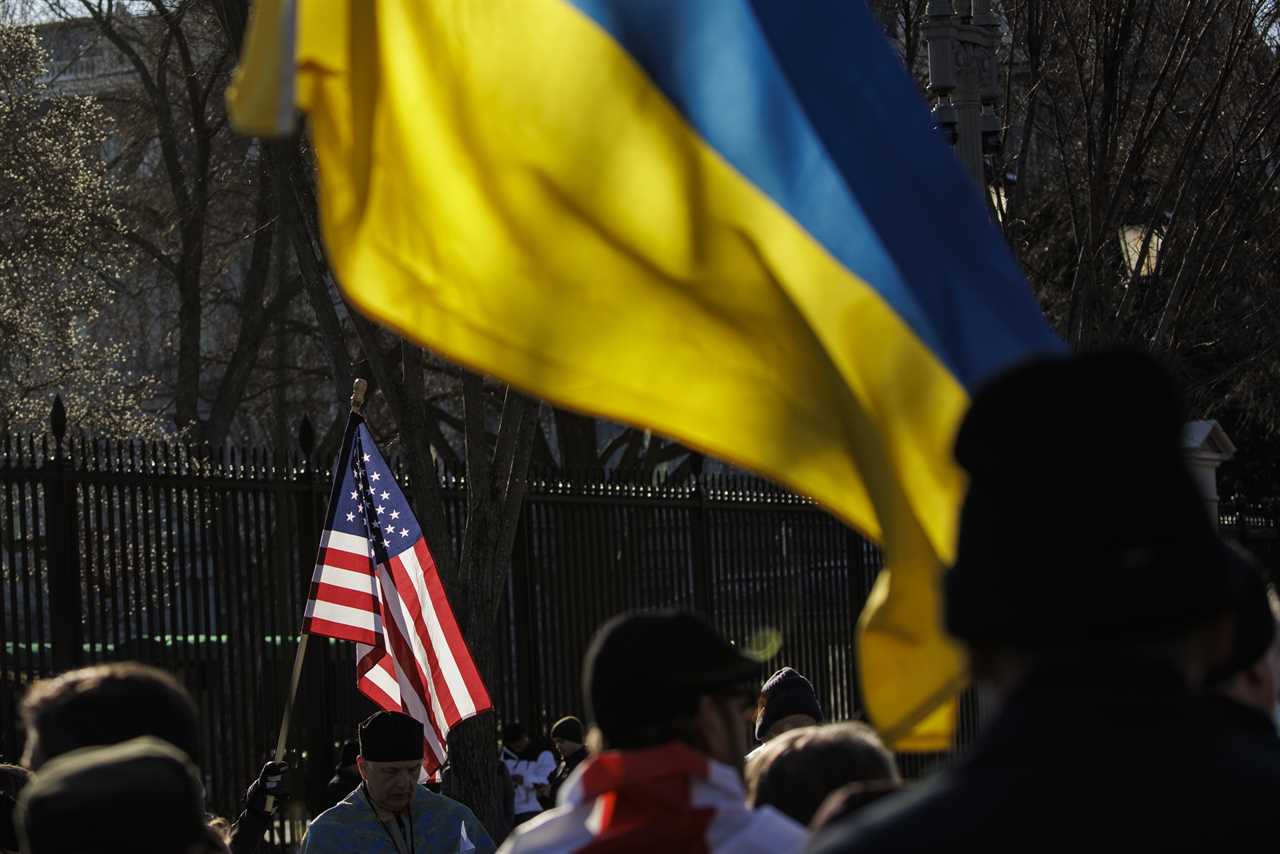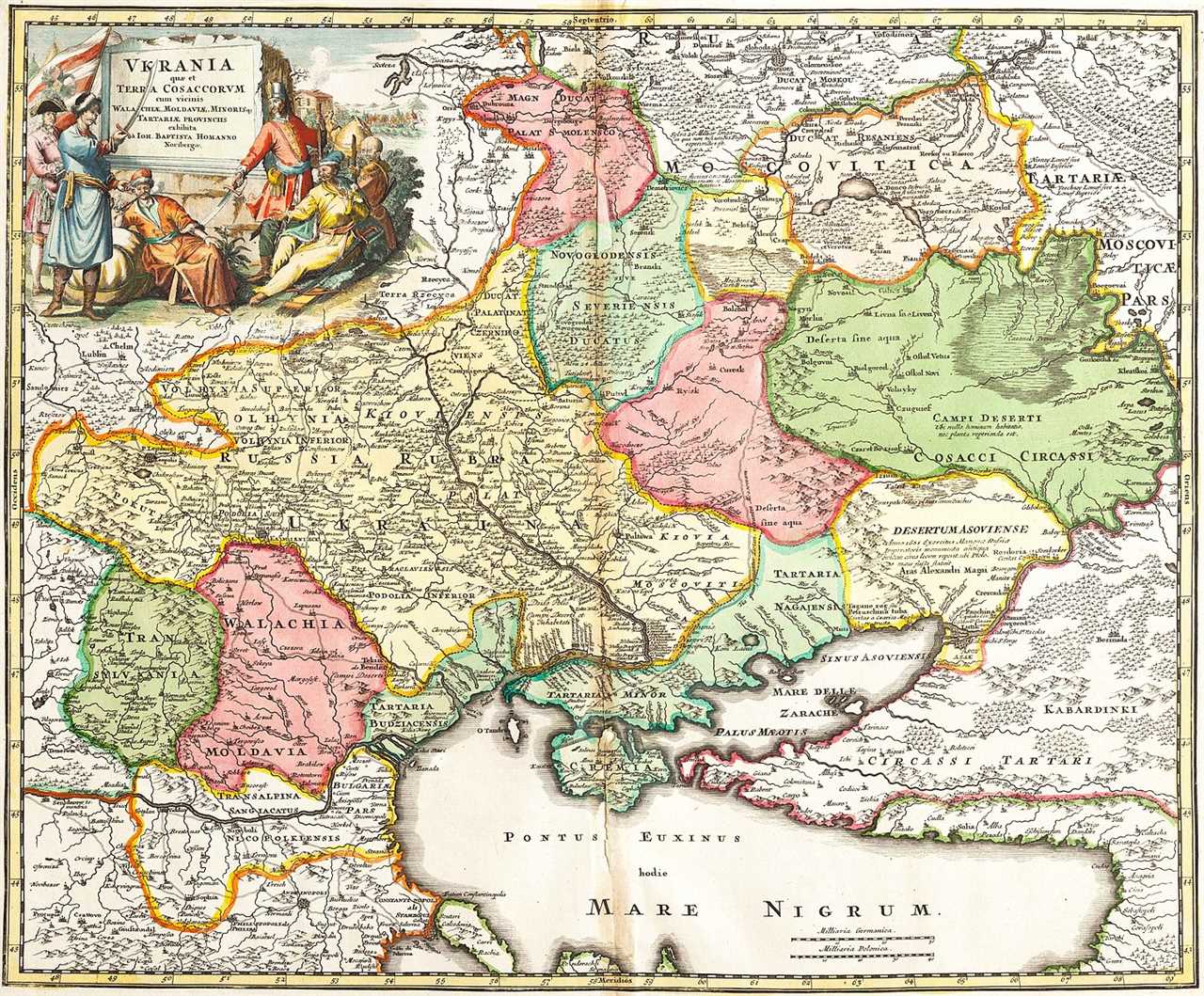
It was just a casual, throwaway description. Last September, the New York Times reported on a series of daring operations by Ukrainian special forces to evacuate civilians from Afghanistan. U.S. troops had left Kabul, and the Taliban had taken complete control. “Enter Ukraine,” the article read, “a small but battle-hardened nation.”
Even today, as Russian troops amass along Ukraine’s borders and threaten a dramatic escalation of their undeclared 8-year war, most Americans would pass over that word: small.
This is a big problem. Ukraine is the largest country by territory within the European continent. Its population is roughly the size of Spain’s. Take even a cursory look at any map — Ukraine is anything but small.
But in the West, our mental maps too often assume otherwise. Ukraine, some argue, is a blip on the radar — it pops up on screens and in newsfeeds roughly once every decade, with the fate of Europe hanging in the balance somewhere over the Dnipro river. The collapse of the Soviet Union in 1991. The Orange Revolution in 2004. The annexation of Crimea in 2014. And now Russian President Vladimir Putin’s geopolitical hostage-taking in 2021-22, eliciting anxiety of a new World War in the making.
To contest the Kremlin’s cascading aggression, start by revising your mental map. Ukraine is a large country of persistent strategic and intellectual significance, and not only because of its diverse human capital, abundant economic potential or pivotal position between Russia and the European Union. Beyond the questions of what they have and where they are, Ukrainians are important for what they do and what they have done.
The truth is that Ukraine’s political and cultural agency has helped shape and reshape the map of Europe for generations. Indeed, Ukrainians have played an active part in the demise of not one, or two, or three, but four different empires, including Austria-Hungary and the Soviet Union.
This role has not been incidental. It has been hard won, driven by a modern national identity primarily based not on ethnic or religious affiliation, but on an idea: universal democratic freedom.
This idea may strike some as saccharine or strange. After all, the image of Ukraine in the West is often one of rapacious oligarchs and corrupt, feuding politicians — and not without good reason. But look beyond Ukraine’s recent history of government and elite intrigue, and you will see a vibrant, grassroots civil society that embodies the egalitarian agenda of Ukrainian civic nationalism. Especially since 2014, after hundreds of thousands of protesters fought against corruption and bled for freedom and rule of law in what has become known in Ukraine as the Revolution of Dignity, Ukrainian civil society has succeeded in compelling the Ukrainian state to do better.
Putin, meanwhile, has gone to extraordinary lengths to allege that there is no such thing as a freestanding Ukrainian national identity. We need to be wise to the con. One of the many fronts of Russia’s war against Ukraine is informational. Time and again Putin has actively sought to push a narrative about Ukraine and Ukrainians as deeply, historically, spiritually embedded in the so-called Russian world. “Russians and Ukrainians,” he insisted last July, are “one people, a single whole.”
Putin’s assertion vividly illustrates a longstanding practice of refusing to frame Ukrainians as the subjects of their own story, of denying them a distinct historical trajectory and cultural agency of their own. Bolshevik leader Vladimir Lenin, of all people, understood this practice. “To ignore the importance of the national question in Ukraine,” he wrote, “means committing a profound and dangerous error.” Lenin spoke of this mistake as a common Russian “sin.”
So what do we see when we take modern Ukrainian nationhood seriously, on its own terms? We see a social and cultural movement with an anticolonial backbone and a suspicion of state institutions led by strongmen. We discover that, in the realm of political values, Ukraine is not Russia’s cousin. It’s Russia’s competitor.
Until the 17th century, nearly all the territory of today’s Ukraine was located within the Polish-Lithuanian Commonwealth — that is, in a Polish “sphere of influence.” Prior to this point, for well over three centuries, the peoples we now call Ukrainians and Russians had traveled in different political orbits altogether.
These orbits intersected in the Treaty of Pereiaslav of 1654 — an event that looms large in the Russian version of Ukrainian history. At this time, Ukraine was a name for the land controlled by the Cossack Hetmanate, an autonomous polity carved from the Polish-Lithuanian Commonwealth after a bloody Cossack rebellion against Kraków. The Ukrainian Cossacks and the Russian tsar made a pact in Pereiaslav that marked the start of an uneasy relationship. It was a transaction between parties who needed language interpreters and referred to each other with terms like “foreigner.” Today, however, the Kremlin presents the Treaty of Pereiaslav as a “reunion” (vossoedinenie), a term that conceals the reality of Russian imperial expansion.
A half century later, Tsar Peter I refused to honor what the Cossacks understood as terms of mutual defense in their alliance, prompting the Cossack leader or “hetman” Ivan Mazepa to turn his forces against Russian power. Years before, Mazepa had written a prescient poetic lament about “mother Ukraine” in tension with an untrustworthy Moscow. Mazepa’s dramatic defeat at the Battle of Poltava in 1709 inspired new lamentations. Peter’s soldiers leveled the capital of the Hetmanate, but Ukrainian Cossack political autonomy still persisted in fits and starts throughout most of the 18th century. Rich, colorful European maps at the time show “Ukraine, Land of the Cossacks” holding on to borders similar to those we know today. In 1775, however, Russian Empress Catherine II, seeking to subsume neighboring peoples into an ever-larger Russian Empire, razed the remaining Ukrainian Cossack strongholds and ushered in the institution of serfdom in their place. Note the historical arc: slow-burning imperial conquest, not eternal confederation.
As it was being absorbed into Russian imperial space in the 18th and 19th centuries, Ukraine was often referred to as “Little Russia,” a term that may go some way to explain lingering impressions of Ukraine as somehow “small” today. But the origins of the name, coined by the Orthodox Patriarch in Constantinople around the turn of the 14th century, when Muscovy was little more than a fledgling principality to the north, likely have less to do with size than with distance. “Rus” was the historical name for both the people and the wide expanse of territory centered in what is today Ukraine and Belarus. For the patriarch in Constantinople, “Little Russia” — or better translated, “Rus Minor” — had a meaning of the Rus close by. It was juxtaposed to “Great Russia” — or better, “Rus Major” — which connoted the Rus farther away, on the periphery. Think of Asia Minor and Asia Major, or even terms like “Greater New York.”
As geopolitical fortunes changed over time, so too did the understanding of these terms. By 1762 Ukrainian writers like Semen Divovych had come to read “little” and “great” as reflections of political power. But Divovych and his compatriots still had no patience for lazy conflations of Ukrainians and Russians as “one people.” Speaking in the voice of “Little Russia” to “Great Russia,” Divovych wrote, “Do not think that you rule over me… You the Great, and I the Little, live in neighboring countries.”

Ukrainians like Divovych frequently made clear their differences with Russians, but it took a trail-blazing poet in the mid-19th century to invest these differences with a clear ethical and political significance. This poet was Taras Shevchenko, and his passion for freedom, disgust for tyrants and distrust of structures of political authority became the primary source code of modern Ukrainian nationhood. Without him, today’s Ukraine would not exist.
Shevchenko made sense of the history of Ukrainians by centering their identity on one key value above all others: freedom, volia. All grassroots national movements pursue freedom for their people, but Shevchenko, a former serf with intimate personal knowledge of slavery and bondage cutting across ethnic and religious lines, privileged the idea of universal democratic freedom itself. He sought freedom for all oppressed peoples, especially the Muslim communities in the Caucasus warding off the Russian forces that surrounded them in their day. His anticolonial watchwords “Boritesia, poborete” — “Fight, you will prevail” — echoed on the streets of Kyiv during the Revolution of Dignity in 2013-14. They resonate throughout the country now.
For Shevchenko, the idea of “mother Ukraine” was an antipode to aristocracy to the west and autocracy to the east. In his poetry he framed Ukrainian identity not primarily as a matter of ethnicity, religion or political allegiance — he had love neither for hetmans nor for tsars — but as a question of cultural authenticity and ethical behavior in the face of twin systems of serfdom and colonialism, which turned human beings into either chattel or canon fodder. “When will Ukraine have its own [George] Washington,” Shevchenko asked, “with a new and righteous law?”
Shevchenko wrote his nation-consolidating poetry in the Ukrainian vernacular, but he also used Russian in his prose. He did not see language politics as a zero-sum game. “Let the Russians write as they like, and let us write as we like,” he declared. “They are a people with a language, and so are we.”
In his verse, Shevchenko privileged Ukrainian, but in his life he practiced what remains today a prominent Ukrainian bilingualism, in which both the Ukrainian and Russian languages can circulate in everyday life. Americans often misread this easy multilingualism, mistaking Ukraine’s linguistic diversity for linguistic adversity — as “Ukrainian speakers” vs. “Russian speakers.” In fact, most Ukrainians can qualify as both, depending on the context, and language use is no clear indicator of political sentiment in Ukraine today in any case. In fact, according to former President Petro Poroshenko, Russian speakers comprise the majority of the thousands of Ukrainian military personnel killed in the ongoing undeclared war with Russia.
Shevchenko’s liberationist message went viral in the Russian Empire. It also resonated with groups of ethnic Russians, Poles, Jews and Crimean Tatars alike, powering a civic nationalist movement that took advantage of the political opening of 1917 to announce the birth of a country: the Ukrainian People’s Republic. The founding declaration was addressed to the people in four languages — Ukrainian, Russian, Polish and Yiddish.
Lenin’s Bolsheviks defeated the Ukrainian People’s Republic a few years later, but only after conceding that Ukraine was a nation deserving of a form of statehood, a concession that helped make Soviet victory possible along the non-Russian peripheries of the tsar’s former empire. After all, the Soviet Union was formally a union of national republics, and the Ukrainians were a central reason why.
The Soviet Union is now long gone. Today, in corridors of the Kremlin heavy with grievance, Russian chauvinism vis-à-vis Ukraine remains strong. Since 2014 it has led to the deaths of thousands of Ukrainian citizens and to the displacement of hundreds of thousands more.
Now it is making hostages of well over 40 million people. In menacing Ukraine’s borders, Putin is not only betting that the West doesn’t care about Ukraine. He is also betting that the West doesn’t know or even see Ukraine. Our ignorance feeds his aggression.
When we work to study Ukraine on its own terms, when we see Ukraine for what it is — a massive, pivotal, unique country whose people are once again at a front line of democratic freedom — we begin to prove him wrong.
----------------------------------------
By: Rory Finnin
Title: Opinion | How the West Gets Ukraine Wrong — and Helps Putin As a Result
Sourced From: www.politico.com/news/magazine/2022/02/12/west-gets-ukraine-wrong-helps-putin-little-russia-00007977
Published Date: Sat, 12 Feb 2022 07:00:00 EST






